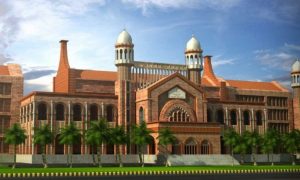A circumstance in which everyone comes out ahead.
The LHC interim respite has been called a “face-saving” for the main stakeholders by political analysts and commentators.

ISLAMABAD:
Imran Khan, the leader of the Pakistan Tehreek-e-Insaf, set a deadline for the dissolution of the Punjab and Khyber-Pakhtunkhwa assemblies that expired on Friday without altering the current situation.
After the LHC reinstated Pervaiz Elahi’s administration and his cabinet, the constitutional crisis brought on by the tit-for-tat manoeuvres by the Punjab governor and the provincial assembly speaker to outmanoeuvre each other was slightly muted.
All the visible and less obvious parties participating in the development of the high-stakes game—the PTI-PML-Q tango and the PML-N—have benefited from the scenario.
Political analysts have characterised the LHC interim respite as a face-saving move for the key actors; the PML-N is relieved that the assemblies are still in place – at least for the time being – while the PTI is pleased that the government has thwarted its attempt to force early elections.
As the PTI and its political allies PML-Q dug their heels in disregarding the discussion of governor’s rule in the province, Governor Balighur Rehman, who is a member of the PML-N, did carry out his threat of de-notifying the chief minister on the matter of a vote of confidence.
“Chance to evaluate plans”
Court orders have given all parties a chance to reevaluate their political plans, according to Professor Emeritus Dr. Hassan Askari, who called this a healthy development in the current political climate.
The distinguished academic pointed out that as Punjab CM Pervaiz Elahi is still in charge of the province, the court’s decision actually benefited him.
Askari said that the assembly was temporarily spared from dissolution but claimed that the PML-intention N’s to choose a new chief minister for the province couldn’t be carried out.
He said it was “embarrassing” for PML-N that the court verdict had established that the governor could not dismiss a sitting chief minister and that PML-N could not realise its ambition of establishing a new chief minister.
Nevertheless, he asserted, the court’s decision has temporarily delayed all of the parties’ plans and given them a chance to be reviewed.
The former prime minister staked his hard-won political ground on Dec. 17 by announcing his eagerly-awaited final date to dissolve the two provincial assemblies where his party controls affairs. He did this in an effort to call early elections. The Punjab and K-P assemblies would be dissolved on Dec. 23 (Friday).
Mahmood Khan, the chief minister of Punjab, had since since repudiated his statement that “Imran Khan will first decide the destiny of the Punjab Assembly.”
In an effort to prevent the provincial legislature from being dissolved, a delegation of MPs from the Pakistan Peoples Party (PPP) and PML-N tabled a no-confidence motion against CM Elahi, resulting in chaos in Punjab.
In addition, Governor Rehman issued an order shortly after the resolution instructing the chief minister to ask the assembly for a vote of confidence on December 21 in an effort to thwart the PTI’s intentions to dissolve the house on Friday.
On Thursday, as night fell in the federal capital, it was assumed that the government had refrained from removing Punjab Chief Minister Pervaiz Elahi from office and imposing governor’s rule in the province because of its endless consultations on the ongoing political struggle, which had so far produced only the word “restrain.”
When the ruling alliance considered the advantages and disadvantages of ousting the provincial chief executive, there was reluctance from the government side, particularly in light of Interior Minister Rana Sanaullah’s exaggerated claims that Elahi was no longer the Punjab chief minister and de-notification was imminent.
Sanaullah’s speech came after the Punjab Assembly refused to give the chief minister a vote of confidence, as directed by Governor Balighur Rehman. Because Punjab Assembly Speaker Sibtain Khan ruled that the governor’s decree was “unconstitutional,” Elahi chose to abstain from the voting.
The PTI announced the dissolution of the assemblies about four weeks ago, but the provincial chief ministers didn’t ask the governors in their respective provinces to dissolve the assembly when there was no obstacle to doing so, according to a key member of the federal cabinet. This indicated that the PTI wanted to maintain the chaotic atmosphere.
He claimed that since the government just intervened a few days prior, dissolution of the assembly might have been accomplished if that had been the desire. He claimed that the government’s apparent goal was to exacerbate the nation’s predicament. If any party moved the court, he said, the matter would be delayed much more.
The Punjab Chief Minister was instructed to seek a vote of confidence on December 21 by Governor Balighur Rehman on December 19. The governor’s letter requesting that the chief minister seek a vote of confidence, according to Speaker Sibtain Khan, was contrary to both the Assembly Rules and the Constitution.
On Wednesday, the province experienced greater unrest after Governor Rehman disagreed with Speaker Sibtain’s decision. Since then, statements have been coming out of both sides that have so far landed in no man’s land.










































